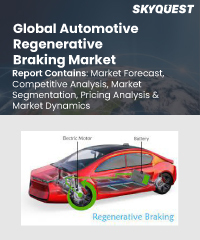
Report ID: SQMIG25C2092
Skyquest Technology's expert advisors have carried out comprehensive research and identified these companies as industry leaders in the Automotive Regenerative Braking Market. This Analysis is based on comprehensive primary and secondary research on the corporate strategies, financial and operational performance, product portfolio, market share and brand analysis of all the leading Automotive Regenerative Braking industry players.
The competitive landscape of the worldwide automobile regenerative braking market is defined by the active engagement of multiple existing companies and escalating rivalry among new entrants. Leading businesses in the industry include significant automakers and technology firms that work to obtain a competitive edge through innovation and tactical plans. Important businesses with a global presence, like Bosch, Continental AG, and ZF Friedrichshafen AG, hold sizable market shares.
Key players are spending a lot of money on research and development to improve their regenerative braking systems and keep up with changing market needs in order to preserve their competitive edge. Regenerative braking control algorithms are being improved, cutting-edge materials are being used in brake components, and energy recovery effectiveness is being increased. These advancements are intended to provide regenerative braking systems that are more dependable and efficient.
Automotive Regenerative Braking Market Top Player’s Company Profiles
REQUEST FOR SAMPLE
Want to customize this report? This report can be personalized according to your needs. Our analysts and industry experts will work directly with you to understand your requirements and provide you with customized data in a short amount of time. We offer $1000 worth of FREE customization at the time of purchase.
Feedback From Our Clients

Report ID: SQMIG25C2092
sales@skyquestt.com
USA +1 351-333-4748